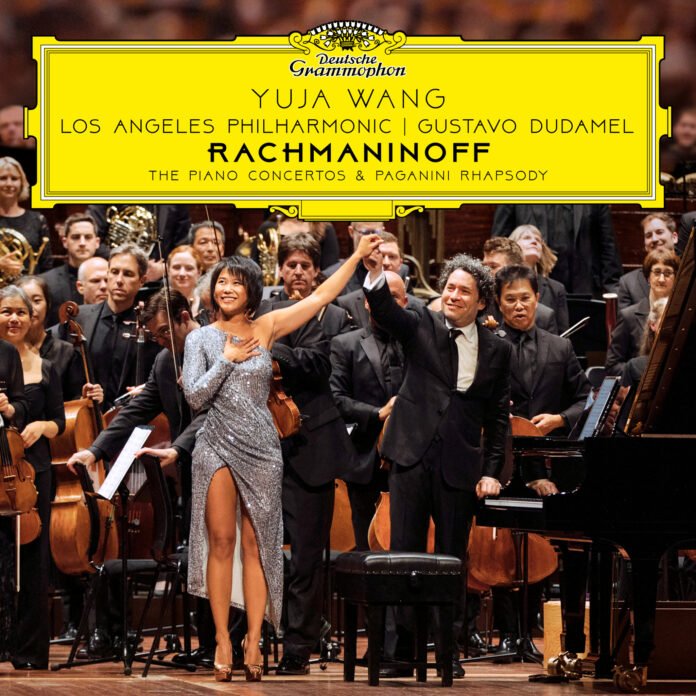Music review Rachmaninoff, The Piano Concertos & Paganini Rhapsody, Yuja Wang (piano), Gustavo Dudamel (conductor), Los Angeles Philharmonic, Deutsche Grammophon
This collection of Rachmaninoff concertos, performed by Yuja Wang, showcases her immense skill at the piano. Even though technically excellent and impressive, it falls short of greatness for two primary reasons: first, the lacklustre orchestral contributions under the conductor’s baton; and second, Wang’s inconsistent approach to tempo in the 2nd and 3rd concertos. The inconsistency is especially puzzling given the existence of Rachmaninoff’s own recordings, which could serve as authoritative reference points for these compositions. Intriguingly, many pianists and conductors choose to diverge from this foundational standard. While some might argue this divergence reflects an individual interpretative choice, others could suggest that performers struggle to adhere to the composer’s original tempi—a claim I find unconvincing given today’s high technical standards for pianists. The true issue often arises when performers attempt to fuse the composer’s intent with their own artistic vision, creating an amalgam that doesn’t always yield successful results, as evidenced here in the 2nd and 3rd concertos alone.
Before diving in, let me reiterate that I will be nitpicking, as I am an avid collector of these concertos. I must also emphasise my profound admiration for both Dudamel and Wang. I consider Dudamel to be a superb conductor of Mahler, while Wang’s interpretations consistently captivate me. With that said, this collection features some exceptional performances, particularly a standout rendition of the 4th concerto, an excellent execution of the 1st, and a riveting final movement of the 3rd. However, despite these high points, I cannot overlook certain shortcomings.
Starting with the first concerto, it stands as a high point in this collection. Both the orchestra and Wang are in exceptional form, with the latter’s technical brilliance fully on display. No complaints here; it’s a top-tier rendition, and I wouldn’t hesitate to place it among the excellent recordings of recent years.
The second concerto, however, presents several challenges. Wang’s very slow treatment of the famous opening chords is perplexing: Yes, there are other pianists, like Krystian Zimerman, who adopt a similar approach, but at least Zimerman maintains a consistent dramatic, chord-laden intensity throughout the piece, following a coherent conception, something that Wang and Dudamel do not seem to attempt here. The Los Angeles Philharmonic string section offers a commendable performance in the first movement, yet the second movement begs for more nuance and textural depth. Not to mention, that the soloist’s climax towards the end feels underwhelming. What this second movement seems to lack, though, is the autumnal atmosphere and sense of longing—qualities that are palpable in other interpretations. And, lastly, in the final movement, greater lyrical depth from Wang in the slower second theme and more engagement from conductor Gustavo Dudamel would have been welcome. For example, the absence of blazing brass in the finale’s glorious climax is especially noticeable when compared to renditions such as that by Andsnes and Pappano.
The third concerto fares better but is not without its flaws. In the first movement, Wang’s performance lacks the excitement and rollercoaster thrills found in Rachmaninoff’s own recording or those by pianists like Stephen Hough, Martha Argerich, Khatia Buniatishvili, and Valentina Lisitsa. However, she does play the shorter cadenza skillfully, which is indeed impressive. The problem here is the woodwind passage that follows, which is conducted at a very slow pace by Dudamel. While this lends an eerie quality to this section and could be seen as a nice contrast after the heavy cadenza, to my ears it suggests a lack of overarching musical and thematic vision—it is as if the whole momentum that has been building so far comes to a halt.
But let’s move on to the Fourth Concerto, which, in my view, stands as a high point in the set. The interplay between the orchestra and soloist is particularly demanding in the first movement—a nuance often overlooked. Here, the orchestra, conductor, and soloist are all in top form. The last movement deserves special attention, as the orchestra’s detailed contributions truly shine. Often considered the underdog among Rachmaninoff’s concertos, this performance is utterly convincing, perhaps lacking a bit in emotional depth. Not only does it highlight the work’s finest qualities, but it also establishes it as a compelling contender within the composer’s oeuvre.
As for the Rhapsody on a Theme of Paganini, it is well-executed but lacks the distinguishing contrast between piano and orchestra that would make it stand out among other esteemed versions. It is technically impeccable, to be sure, but misses a certain spark of excitement or fresh interpretation that could set it apart.
In summary, this could have been a monumental recording of the Concertos and the Rhapsody if the orchestral sections had been more engaging, the tempo choices better aligned with the composer’s own recordings (but only in the 2nd and 3rd concertos), and if the performers had brought new insights to these well-trodden pieces. While expectations are generally high for any new interpretation of these virtuosic concertos, this set satisfies but does not exceed them. It’s a very fine collection, but there are more thrilling and emotionally rich renditions available elsewhere.
Would I still recommend this set? Sure! One can’t have enough of these warhorses, and I would purchase it solely for Yuja Wang’s dazzling virtuosity.
On a High Note
- Technical Brilliance: Yuja Wang’s exceptional skill at the piano is evident, particularly in the first concerto and the last movement of the third.
- First Concerto Excellence: Both the orchestra and Wang deliver a top-tier rendition in the first concerto, with no apparent flaws.
- Fourth Concerto Surprise: Often considered the underdog, the Fourth Concerto stands out in this set, especially in terms of orchestral and soloist interplay.
Room for Variation
- Inconsistent Tempo: Wang’s approach to tempo is inconsistent and doesn’t always align with Rachmaninoff’s own recordings in the 2nd and 3rd concertos, which could serve as authoritative references. Not a big deal but purists might disagree.
- Orchestral Shortcomings: The orchestra’s contribution under the conductor’s direction often falls short in terms of engagement and nuance, particularly in the Second and Third Concertos.
- Lack of Fresh Interpretation: The performance, while technically solid, doesn’t bring any new insights or exciting variations to these well-known pieces.






